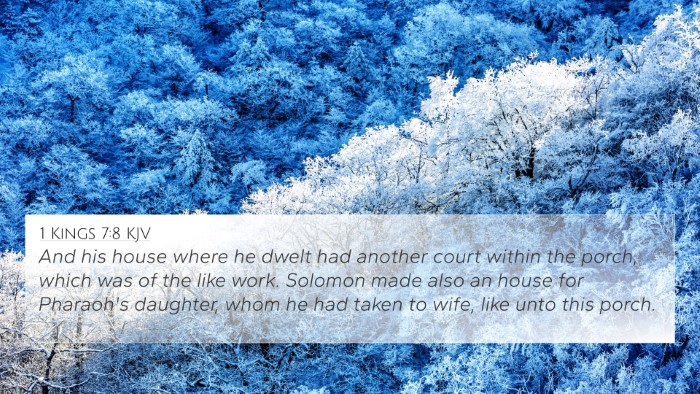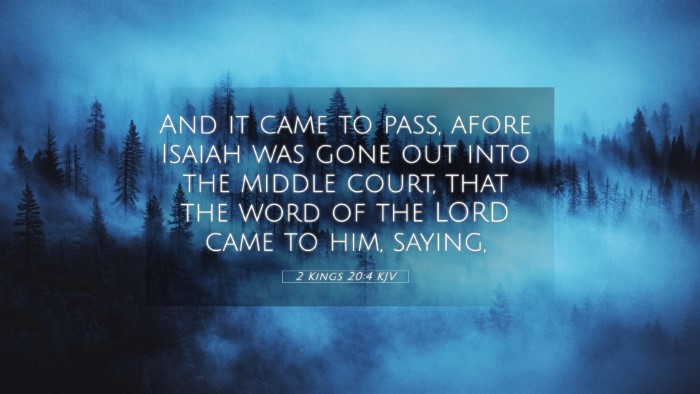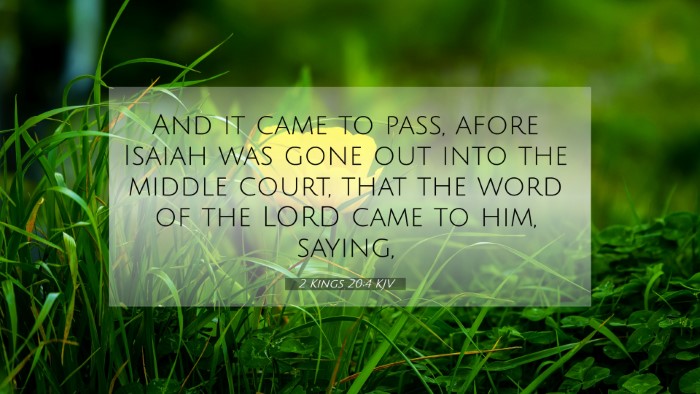Old Testament
Genesis Exodus Leviticus Numbers Deuteronomy Joshua Judges Ruth 1 Samuel 2 Samuel 1 Kings 2 Kings 1 Chronicles 2 Chronicles Ezra Nehemiah Esther Job Psalms Proverbs Ecclesiastes Song of Solomon Isaiah Jeremiah Lamentations Ezekiel Daniel Hosea Joel Amos Obadiah Jonah Micah Nahum Habakkuk Zephaniah Haggai Zechariah Malachi2 Kings 20:4 Similar Verses
2 Kings 20:4 Cross References
And it came to pass, afore Isaiah was gone out into the middle court, that the word of the LORD came to him, saying,
Uncover the Rich Themes and Topics of This Bible Verse
Listed below are the Bible themes associated with 2 Kings 20:4. We invite you to explore each theme to gain deeper insights into the Scriptures.
2 Kings 20:4 Cross Reference Verses
This section features a detailed cross-reference designed to enrich your understanding of the Scriptures. Below, you will find carefully selected verses that echo the themes and teachings related to 2 Kings 20:4 KJV. Click on any image to explore detailed analyses of related Bible verses and uncover deeper theological insights.

1 Kings 7:8 (KJV) »
And his house where he dwelt had another court within the porch, which was of the like work. Solomon made also an house for Pharaoh's daughter, whom he had taken to wife, like unto this porch.

2 Kings 22:14 (KJV) »
So Hilkiah the priest, and Ahikam, and Achbor, and Shaphan, and Asahiah, went unto Huldah the prophetess, the wife of Shallum the son of Tikvah, the son of Harhas, keeper of the wardrobe; (now she dwelt in Jerusalem in the college;) and they communed with her.
2 Kings 20:4 Verse Analysis and Similar Verses
Bible Verse: 2 Kings 20:4
Meaning and Interpretation:
In 2 Kings 20:4, we witness a significant moment in the life of King Hezekiah. The verse states, "And it came to pass, before Isaiah was gone out into the middle court, that the word of the LORD came to him, saying,". This moment emphasizes the immediacy of God's communication and His willingness to respond to the prayers of His faithful servants.
Contextual Background:
- King Hezekiah had just received a grim prophecy from the prophet Isaiah concerning his impending death due to illness.
- Hezekiah turned to the Lord in prayer, pouring out his heart, which indicates a deep personal relationship with God.
- This verse illustrates the transition from a declaration of judgment to God's mercy and healing.
Commentary Insights:
- Matthew Henry: He notes that God's immediate response to Hezekiah's supplication illustrates the grace and mercy of God. It shows that while God is just, He is also compassionate and responsive to human desperation.
- Albert Barnes: He emphasizes the importance of prayer in desperate times and how God often answers before our requests have fully left our lips. Barnes also highlights the trustworthiness of God in delivering His promises promptly.
- Adam Clarke: Clarke sees this verse as a demonstration of divine intervention. He points out that the rapidity of God's message serves to reassure believers of God's active presence and responsiveness in their lives.
Implications for Believers:
- This verse can remind us that in times of crisis, turning to God in prayer is paramount. Just like Hezekiah, we are encouraged to lay our burdens before the Lord.
- The immediacy of God's answer encourages faith in His promises, suggesting that God is always near and ready to help. He listens to the cries of His people.
Cross-References from the Bible:
- Isaiah 38:1-5 - Hezekiah's illness and God's promise of healing.
- James 5:16 - The power of prayer and its effect on healing.
- Psalm 34:17-18 - The Lord is near to the brokenhearted and saves the crushed in spirit.
- John 11:41-44 - Jesus raises Lazarus, showing God's power over life and death.
- Matthew 18:19-20 - Assurance that God hears the prayers of the gathered believers.
- 1 John 5:14-15 - Confidence in approaching God and His will in prayer.
- Isaiah 65:24 - God answering before we call, which aligns with Hezekiah's experience.
Conclusion:
2 Kings 20:4 serves as a powerful reminder of God's responsiveness to the prayers of His people. Through the lens of commentary insights and cross-references, believers can see the broader thematic implications of prayer, healing, and divine compassion throughout the Scriptures.


